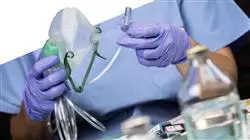University certificate
The world's largest faculty of nursing”
Introduction to the Program
Thanks to this Postgraduate diploma, taught 100% online, you will provide high quality nursing care to your pediatric patients through the effective use of Advanced Monitoring"

According to a recent report by the World Health Organization, pediatric cardiopulmonary arrest has a high incidence globally. This can occur for a variety of reasons, from complications due to prematurity to airway obstruction. In this context, nurses have the responsibility to update their knowledge regularly to incorporate into their daily practice the most modern techniques to perform advanced monitoring and optimize therapeutic treatments for infants according to their physiological responses. However, this can be a challenge given the complexity of balancing their professional activity with the rest of their daily activities.
To facilitate this update, TECH implements a revolutionary Postgraduate diploma in Advanced Pediatric and Neonatal Patient Monitoring for Nursing . Designed by references in this field of expertise, the syllabus will address in depth the monitoring of specific vital parameters to provide optimal care for children. Along these lines, the syllabus will delve into the different routes for the administration of drugs, while providing the safest techniques for the approach of users in critical pain and even in a state of sedation. The teaching materials will also emphasize the importance of the ethical framework in these cases, stressing the need for the victims' families to provide informed consent.
Moreover, this university program is based on the innovative Relearninglearning system. Thanks to this, students will reduce the number of hours of study and will solidly consolidate the concepts addressed throughout this academic itinerary. All students need is a device with an Internet connection (smartphone, computer or tablet) to enter the virtual platform and access the most dynamic teaching resources on the academic market.
You will effectively employ Advanced Monitoring systems to contribute to informed, evidence-based clinical decision making"
This Postgraduate diploma in Advanced Pediatric and Neonatal Patient Monitoring for Nursing contains the most complete and up-to-date scientific program on the market. The most important features include:
- Practice cases presented by experts in Advanced Life Support and Monitoring in the Critically Ill Patient
- The graphic, schematic, and practical contents with which they are created, provide scientific and practical information on the disciplines that are essential for professional practice
- Practical exercises where self-assessment can be used to improve learning
- Its special emphasis on innovative methodologies
- Theoretical lessons, questions to the expert, debate forums on controversial topics, and individual reflection assignments
- Content that is accessible from any fixed or portable device with an Internet connection
You will delve into the care during intubation and extubation processes, ensuring the safety of infants at all times"
The program’s teaching staff includes professionals from the field who contribute their work experience to this educational program, as well as renowned specialists from leading societies and prestigious universities.
The multimedia content, developed with the latest educational technology, will provide the professional with situated and contextual learning, i.e., a simulated environment that will provide immersive education programmed to learn in real situations.
This program is designed around Problem-Based Learning, whereby the professional must try to solve the different professional practice situations that arise during the academic year For this purpose, the students will be assisted by an innovative interactive video system created by renowned and experienced experts.
You will incorporate the most advanced Non Invasive Mechanical Ventilation techniques into your daily practice to prevent respiratory complications and optimize your patients' care"

The Relearning system implemented in this program will make you learn with less effort and more performance. Forget about memorizing!"
Why study at TECH?
TECH is the world’s largest online university. With an impressive catalog of more than 14,000 university programs available in 11 languages, it is positioned as a leader in employability, with a 99% job placement rate. In addition, it relies on an enormous faculty of more than 6,000 professors of the highest international renown.

Study at the world's largest online university and guarantee your professional success. The future starts at TECH”
The world’s best online university according to FORBES
The prestigious Forbes magazine, specialized in business and finance, has highlighted TECH as “the world's best online university” This is what they have recently stated in an article in their digital edition in which they echo the success story of this institution, “thanks to the academic offer it provides, the selection of its teaching staff, and an innovative learning method aimed at educating the professionals of the future”
A revolutionary study method, a cutting-edge faculty and a practical focus: the key to TECH's success.
The most complete study plans on the university scene
TECH offers the most complete study plans on the university scene, with syllabuses that cover fundamental concepts and, at the same time, the main scientific advances in their specific scientific areas. In addition, these programs are continuously being updated to guarantee students the academic vanguard and the most in-demand professional skills. In this way, the university's qualifications provide its graduates with a significant advantage to propel their careers to success.
TECH offers the most comprehensive and intensive study plans on the current university scene.
A world-class teaching staff
TECH's teaching staff is made up of more than 6,000 professors with the highest international recognition. Professors, researchers and top executives of multinational companies, including Isaiah Covington, performance coach of the Boston Celtics; Magda Romanska, principal investigator at Harvard MetaLAB; Ignacio Wistumba, chairman of the department of translational molecular pathology at MD Anderson Cancer Center; and D.W. Pine, creative director of TIME magazine, among others.
Internationally renowned experts, specialized in different branches of Health, Technology, Communication and Business, form part of the TECH faculty.
A unique learning method
TECH is the first university to use Relearning in all its programs. It is the best online learning methodology, accredited with international teaching quality certifications, provided by prestigious educational agencies. In addition, this disruptive educational model is complemented with the “Case Method”, thereby setting up a unique online teaching strategy. Innovative teaching resources are also implemented, including detailed videos, infographics and interactive summaries.
TECH combines Relearning and the Case Method in all its university programs to guarantee excellent theoretical and practical learning, studying whenever and wherever you want.
The world's largest online university
TECH is the world’s largest online university. We are the largest educational institution, with the best and widest online educational catalog, one hundred percent online and covering the vast majority of areas of knowledge. We offer a large selection of our own degrees and accredited online undergraduate and postgraduate degrees. In total, more than 14,000 university degrees, in eleven different languages, make us the largest educational largest in the world.
TECH has the world's most extensive catalog of academic and official programs, available in more than 11 languages.
Google Premier Partner
The American technology giant has awarded TECH the Google Google Premier Partner badge. This award, which is only available to 3% of the world's companies, highlights the efficient, flexible and tailored experience that this university provides to students. The recognition as a Google Premier Partner not only accredits the maximum rigor, performance and investment in TECH's digital infrastructures, but also places this university as one of the world's leading technology companies.
Google has positioned TECH in the top 3% of the world's most important technology companies by awarding it its Google Premier Partner badge.
The official online university of the NBA
TECH is the official online university of the NBA. Thanks to our agreement with the biggest league in basketball, we offer our students exclusive university programs, as well as a wide variety of educational resources focused on the business of the league and other areas of the sports industry. Each program is made up of a uniquely designed syllabus and features exceptional guest hosts: professionals with a distinguished sports background who will offer their expertise on the most relevant topics.
TECH has been selected by the NBA, the world's top basketball league, as its official online university.
The top-rated university by its students
Students have positioned TECH as the world's top-rated university on the main review websites, with a highest rating of 4.9 out of 5, obtained from more than 1,000 reviews. These results consolidate TECH as the benchmark university institution at an international level, reflecting the excellence and positive impact of its educational model.” reflecting the excellence and positive impact of its educational model.”
TECH is the world’s top-rated university by its students.
Leaders in employability
TECH has managed to become the leading university in employability. 99% of its students obtain jobs in the academic field they have studied, within one year of completing any of the university's programs. A similar number achieve immediate career enhancement. All this thanks to a study methodology that bases its effectiveness on the acquisition of practical skills, which are absolutely necessary for professional development.
99% of TECH graduates find a job within a year of completing their studies.
Postgraduate Diploma in Advanced Monitoring of the Paediatric and Neonatal Patient for Nurses
At TECH, we invite you to explore new frontiers in the care of the paediatric and neonatal patient with our postgraduate course in Advanced Monitoring. This innovative programme is designed for nursing professionals seeking to acquire the skills and knowledge necessary to provide comprehensive and specialised care to critically ill paediatric and neonatal patients, using the latest technologies available. Immerse yourself in a comprehensive academic programme that will allow you to: delve into the pathophysiological, diagnostic and therapeutic principles of paediatric and neonatal critical patient management, with a focus on advanced monitoring techniques; develop skills in haemodynamic, respiratory and neurological monitoring of the paediatric and neonatal patient using state-of-the-art equipment; expand your knowledge of the latest research and advances in paediatric and neonatal patient monitoring, among other key competencies that will boost your career.
Lead paediatric and neonatal nursing with this postgraduate course
Studying at TECH offers you multiple benefits: online classes that allow you to access all the content from the comfort of your home or workplace, the Relearning methodology that optimises your learning, personalised tutorials to help you overcome any difficulties and achieve your learning objectives, and up-to-date study material that is easy to access so you can delve deeper into the topics of greatest interest, including multimedia resources and access to specialised databases. At the end of this training programme, you will be able to perform a range of functions from carrying out a comprehensive assessment of the critically ill paediatric and neonatal patient, identifying their needs and risks, to managing the most common complications associated with the critically ill paediatric and neonatal patient effectively and safely, using state-of-the-art equipment and techniques. Take the next step in your professional career, enrol now in TECH and get ready to make a difference in the lives of your patients!







